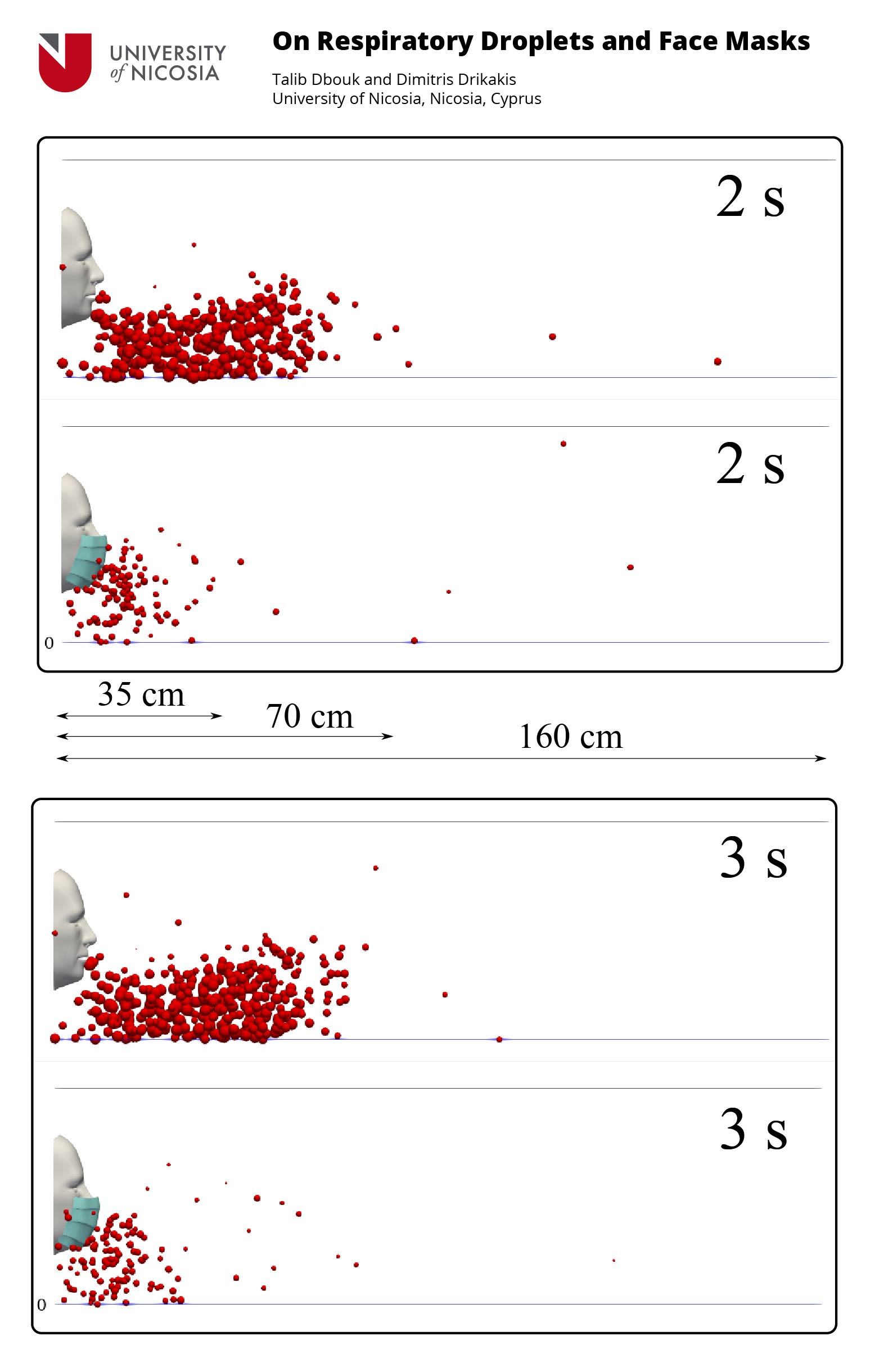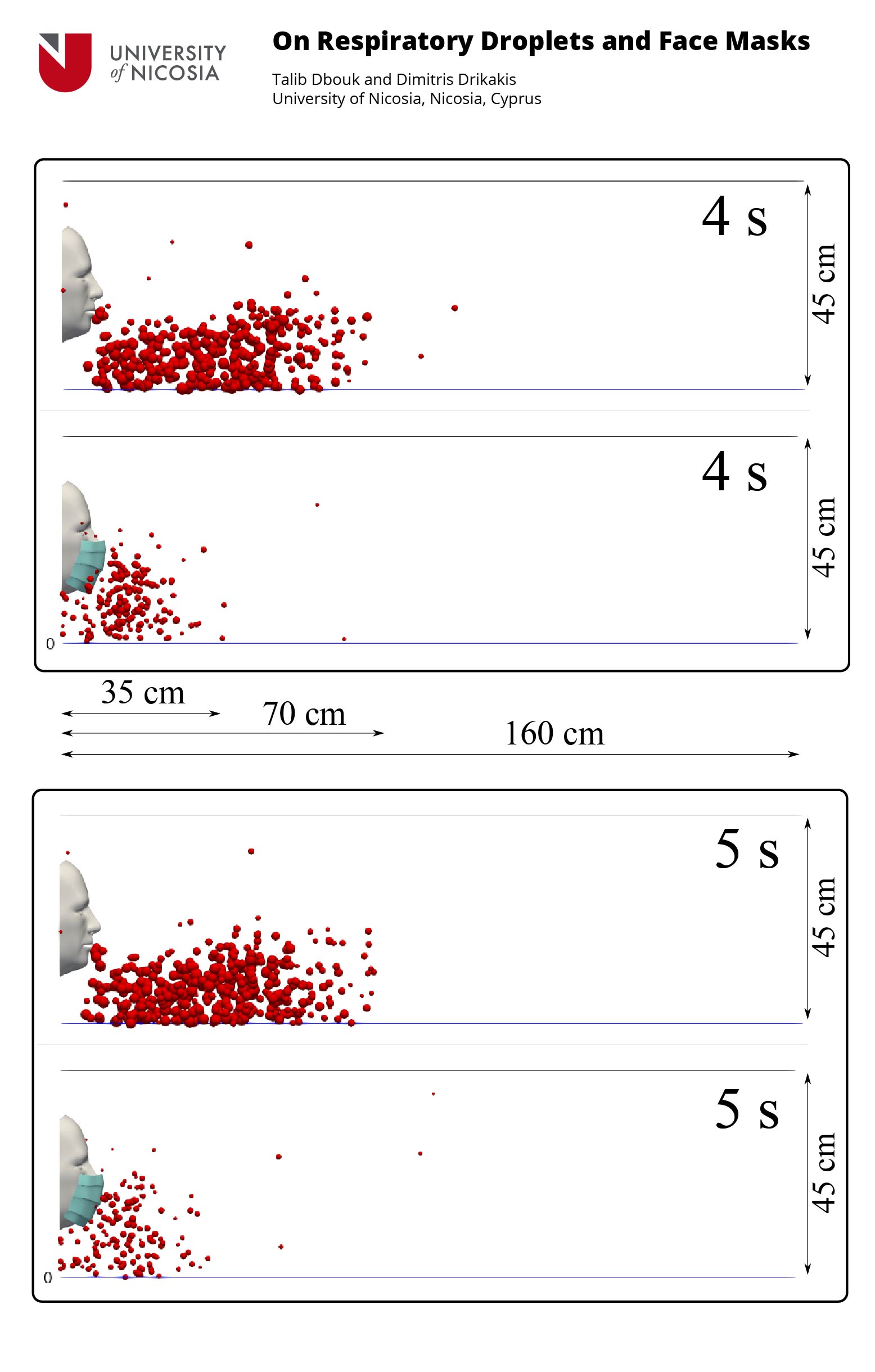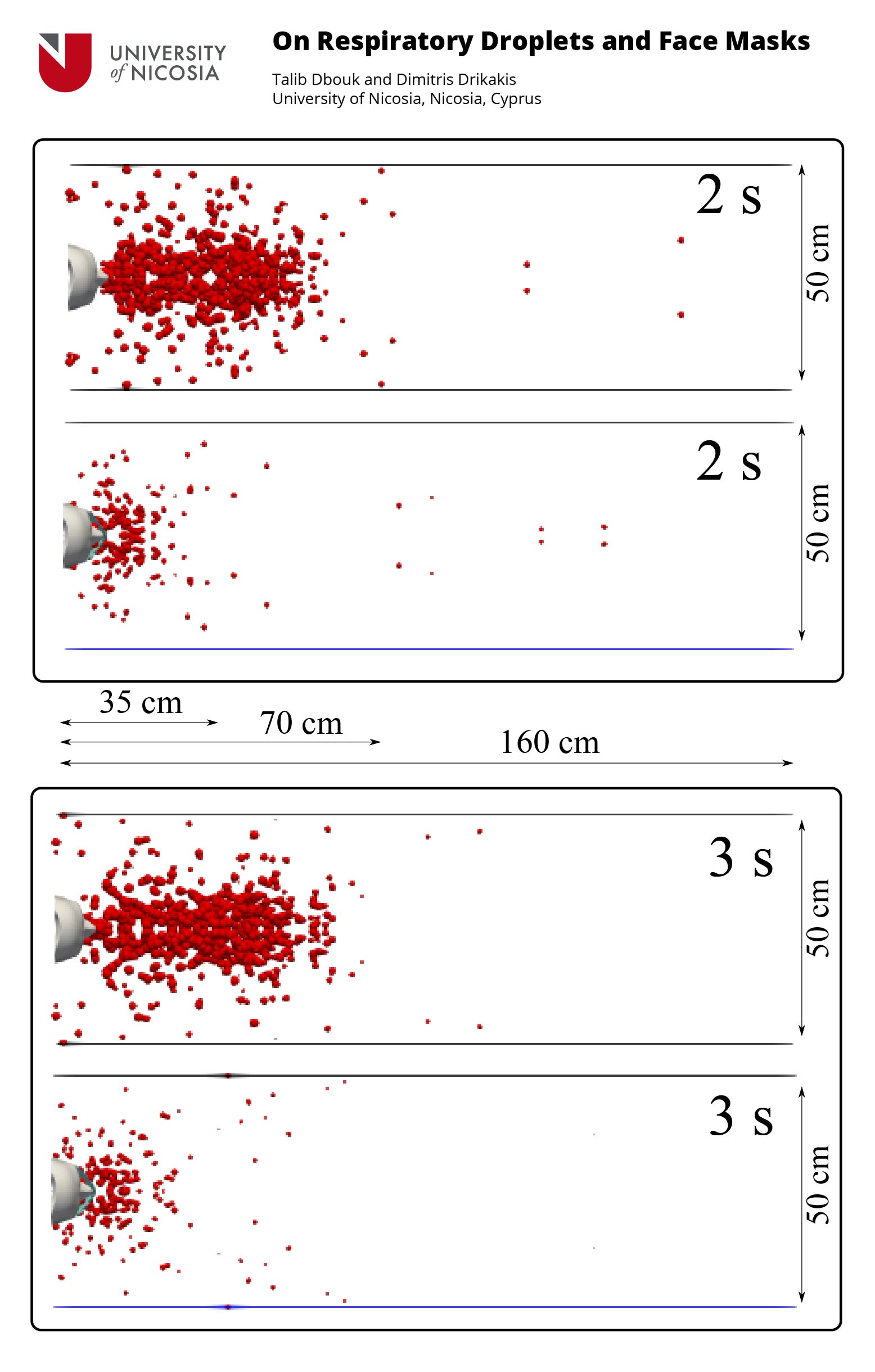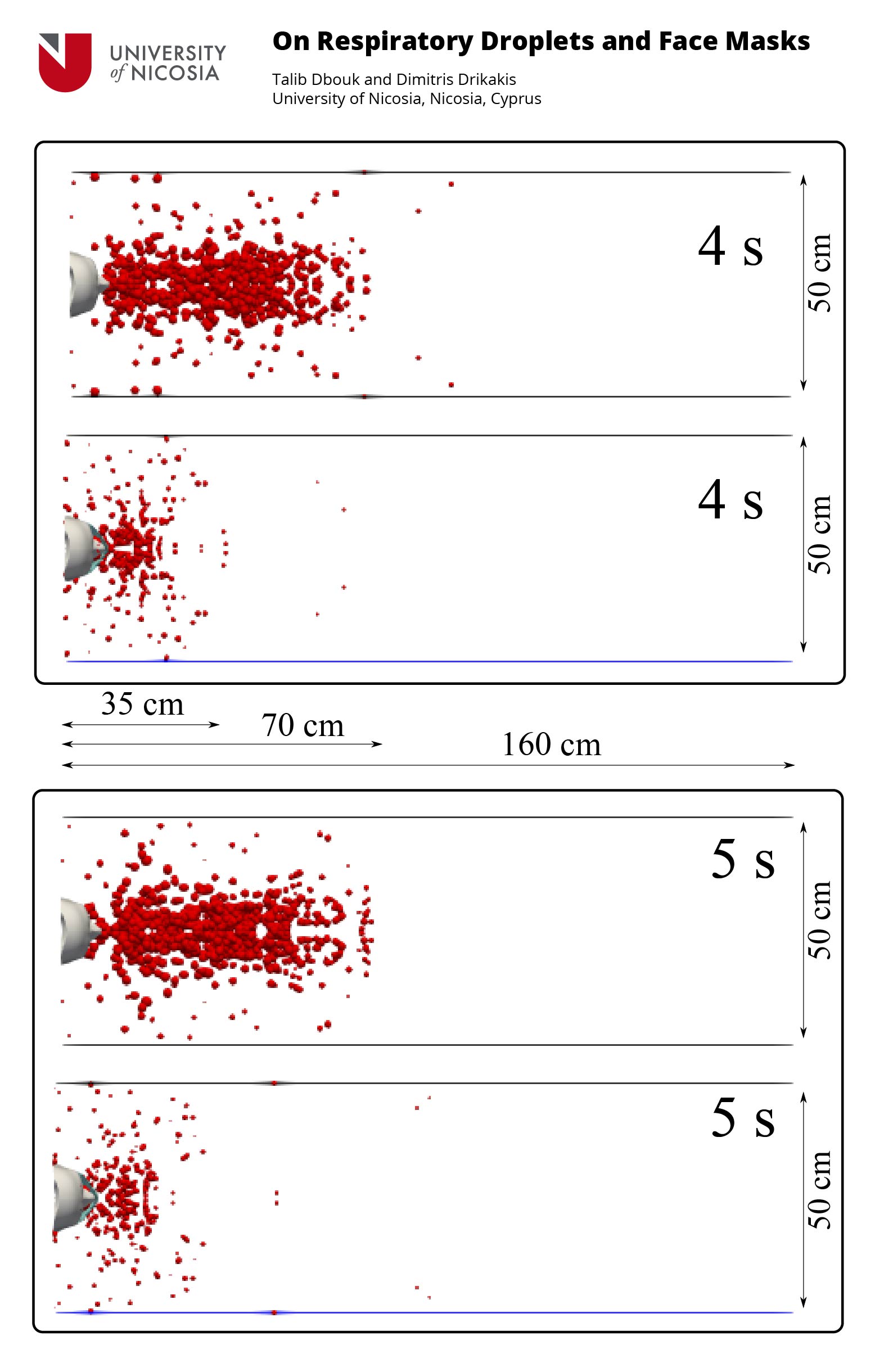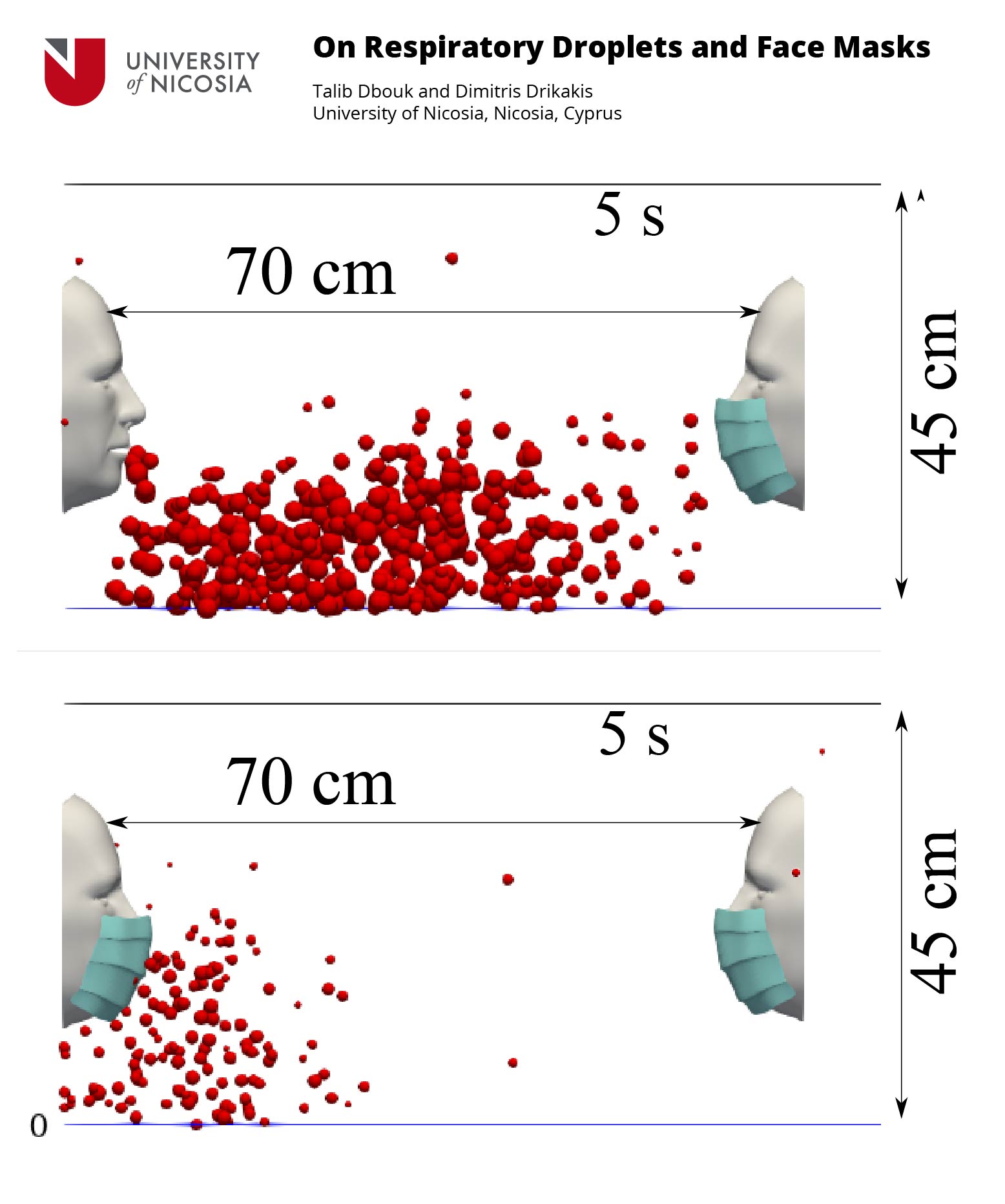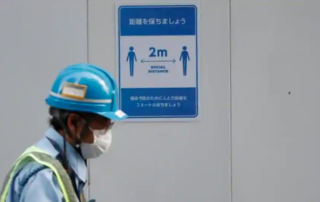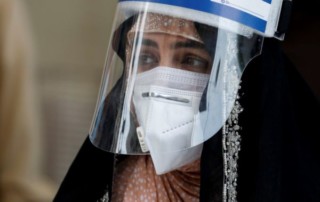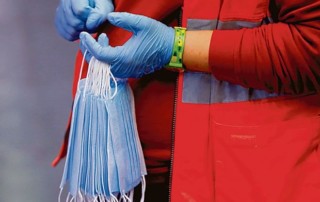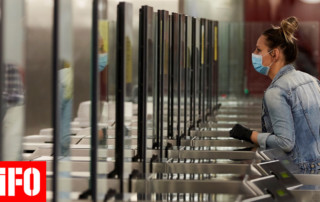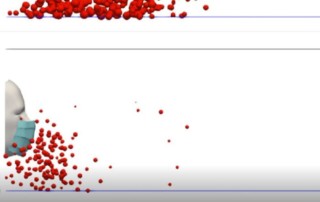COVID-19
UNIC Coronavirus Health and Research Portal
On Respiratory Droplets and Face Masks
Talib Dbouk and Dimitris Drikakis
University of Nicosia, Nicosia, Cyprus
Face mask filters – textile, surgical or respiratory – are widely used in the effort to limit the spread of airborne viral infections. Our understanding of the droplet dynamics around a face mask filter, including the droplet containment, leakage from and passing through the cover, is incomplete.
The authors present a fluid dynamics study of the transmission of respiratory droplets through and around a face mask filter. By employing multiphase computational fluid dynamics Dbouk & Drikakis investigate the droplet dynamics induced by a mild coughing incident and examine the fluid dynamics phenomena affecting the mask efficiency. The model takes into account turbulent dispersion forces, droplet phase-change, evaporation, and breakup in addition to the droplet–droplet and droplet–air interactions. The model mimics real events by using data which closely resemble cough experiments.
The study shows that the criteria employed for assessing the face mask performance must be modified to take into account: the penetration dynamics of airborne droplet transmission, the fluid dynamics leakage around the filter, and reduction of efficiency during cough cycles. A new criterion for calculating more accurately the mask efficiency by taking into account the penetration dynamics, is proposed.
We show that the use of masks will reduce the airborne droplet transmission and will also protect the wearer from the droplets expelled from other subjects. However, many droplets still spread around and away from the cover, cumulatively, during cough cycles. Therefore, the use of a mask does not provide complete protection, and social distancing remains important during a pandemic. The implications of the reduced mask efficiency and respiratory droplet transmission away from the mask are even more critical for healthcare workers. The results of this study provide evidence of droplet transmission prevention by face masks, which can guide their use and further improvement.
Figure 1
A subject coughing in a cyclic incidence. A qualitative examination of airborne droplet transmission with and without wearing a surgical mask. The top and bottom figures show the results at 2 s and 3 s, respectively. Wearing a surgical mask that exhibits an initial efficiency of ∼91%. This cannot prevent the transport of the saliva droplets away from the subject. Many droplets penetrate the mask shield and some saliva droplet disease-carrier particles can travel more than 1.2 m. For visualization, the droplets were scaled by a factor of 600 compared to their actual size. The environmental conditions are zero wind speed, ambient temperature 20 ○C, pressure 1 atm, and relative humidity 50%. The mouth temperature is 34 ○C and the face skin temperature is 32 ○C.
Figure 2
A subject coughing in a cyclic incidence. A qualitative examination of airborne droplet transmission with and without wearing a surgical mask. The top and bottom figures show the results at 4 s and 5 s, respectively. Wearing a surgical mask that exhibits initial efficiency of ∼91%. This cannot prevent the transport of the saliva droplets away from the subject. Many droplets penetrate the mask shield and some saliva droplet disease-carrier particles can travel more than 1.2 m. For visualization, the droplets were scaled by a factor of 600 compared to their actual size. The environmental conditions are zero wind speed, ambient temperature 20 ○C, pressure 1 atm, and relative humidity 50%. The mouth temperature is 34 ○C, and the face skin temperature is 32 ○ C.
Figure 3
A subject coughing in a cyclic incidence. Top view of a qualitative examination of airborne droplet transmission with and without wearing a surgical mask. The top and bottom figures show the results at 2 s and 3 s, respectively. We consider a surgical mask that exhibits initial efficiency of ∼91%. The cover does not prevent the transport of the saliva droplets entirely away from the subject. Many droplets penetrate the mask shield, and some saliva droplet disease-carrier particles can travel more than 1.2 m. For visualization, the droplets were scaled by a factor of 600 compared to their actual size. The environmental conditions are zero wind speed, ambient temperature 20 ○C, pressure 1 atm, and relative humidity 50%. The mouth temperature is 34 ○C, and the face skin temperature is 32 ○C.
Figure 4
A subject coughing in a cyclic incidence. Top view of airborne droplet transmission with and without wearing a surgical mask. The top and bottom figures show the results at 4 s and 5 s, respectively. We consider a surgical mask that exhibits an initial efficiency of ∼91%. The cover does not prevent the transport of the saliva droplets entirely away from the subject. Many droplets penetrate the mask shield and some saliva droplet disease-carrier particles can travel more than 1.2 m. For visualization, the droplets were scaled by a factor of 600 compared to their actual size. The environmental conditions are zero wind speed, ambient temperature 20 ○C, pressure 1 atm, and relative humidity 50%. The mouth temperature is 34 ○C, and the face skin temperature is 32 ○C.
Figure 5
Mask wearer: subjects wearing a mask will reduce the respiratory droplet transmission while (partially) shielding themselves from other subjects experiencing a coughing incident. We show the results at 5 s simulation time for a surgical mask exhibiting an initial efficiency of ∼91%. The environmental conditions are zero wind speed, ambient temperature 20 ○C, pressure 1 atm, and relative humidity 50%. The mouth temperature is 34 ○C and the face skin temperature is 32 ○C.
What Does This Mean?
According to the results of this study, the authors made recommendations that are summarised below:
- Although masks will reduce the droplet transmission, we should not ignore that several droplets will be transmitted away from the mask. The use of a mask will not provide complete prevention from airborne droplet transmission. The above is particularly important, both for indoor and outdoor environments. As Dbouk and Drikakis showed in a previous study (https://aip.scitation.org/doi/10.1063/5.0011960) respiratory droplets can be transmitted to several meters away from the subject due to wind conditions. Therefore, social distancing remains essential when facing an evolving pandemic.
- The above recommendation implies that we can protect healthcare workers only if we equip them with a complete PPE, e.g., completely a helmet with a built-in air filter, a face shield together with a disposable suit over the whole ensemble and a double set of gloves.
- The manufacturers and regulatory authorities should consider new criteria for assessing mask performance, to account for the flow physics and cough dynamics. The authors provided a simple criterion that takes into account the efficiency reduction during a cyclic coughing incident.
Video 1
A subject coughing in a cyclic incidence. A qualitative examination of airborne droplet transmission with and without wearing a surgical mask.
The University of Nicosia (UNIC)
About the University of Nicosia
The University of Nicosia (UNIC) is the largest university in Cyprus, and the largest university in southern Europe that teaches primarily in English, welcoming 12,000+ students from over 70 countries worldwide. The University of Nicosia is a comprehensive university with 6 schools, 20 departments and over 100 degree programs offered on-campus and online.
The University of Nicosia is best known in the fields of medicine, law, blockchain, accounting, education, forecasting and international relations and for a series of partnerships with other leading European universities. UNIC was most recently ranked #106 in its region by QS and #300 to #400 globally in the Times Higher Education Impact rankings.
To learn more about the University of Nicosia, please see: https://www.unic.ac.cy/
UNIC’s COVID-19 Response
University of Nicosia faculty across a variety of academic disciplines are actively engaged in research and analysis and serving in scientific / public policy roles supporting the global COVID-19 response.
For more information about the University of Nicosia’s work relating to COVID-19 including potential collaboration, please see: https://www.unic.ac.cy/coronavirus/
Contact Information
For more information about this study, please contact Prof Dimitris Drikakis at drikakis.d@unic.ac.cy.
For more information on our COVID-19 related research in general, please contact UNIC at covid19@unic.ac.cy.
Press Coverage
Articles and press mentions in global media about the research.
Covid-19: Filtering capacity of face masks ‘adversely affected’ by repeated coughing – health – Hindustan Times
Covid-19: Filtering capacity of face masks ‘adversely affected’ by repeated coughing - health While facial masks reduce the spread of COVID-19, their filtering efficiency is adversely affected by repeated coughing, according to a new study which recommends complete personal protective equipment for healthcare workers including helmets with built-in air filters, and face shields. Scientists, including Talib Dbouk and Dimitris Drikakis from the University of Nicosia in Cyprus, used computer models to map out the expected flow patterns of small droplets [...]
Repeated Coughing ‘Adversely Affects’ Filtering Capacity of Face Masks, Finds Study – News18 English | DailyHunt
Repeated Coughing 'Adversely Affects' Filtering Capacity of Face Masks, Finds Study London: While facial masks reduce the spread of Covid-19, their filtering efficiency is adversely affected by repeated coughing, according to a new study which recommends complete personal protective equipment for healthcare workers including helmets with built-in air filters, and face shields. Scientists, including Talib Dbouk and Dimitris Drikakis from the University of Nicosia in Cyprus, used computer models to map out the expected flow patterns of small droplets released [...]
Filtering capacity of face masks ‘adversely affected’ by repeated coughing, study says : The Tribune India
Filtering capacity of face masks 'adversely affected' by repeated coughing, study says : The Tribune India While facial masks reduce the spread of COVID-19, their filtering efficiency is adversely affected by repeated coughing, according to a new study which recommends complete personal protective equipment for healthcare workers including helmets with built-in air filters, and face shields. Scientists, including Talib Dbouk and Dimitris Drikakis from the University of Nicosia in Cyprus, used computer models to map out the expected flow patterns [...]
Repeated coughing seriously degrades face mask efficiency: Study – Social News XYZ
Repeated coughing seriously degrades face mask efficiency: Study London, June 17 (SocialNews.XYZ) Face masks slow the spread of viruses, including the novel coronavirus that causes Covid-19, but their filtering efficiency is adversely affected by repeated coughing, say researchers. "Masks decrease droplet accumulation during repeated cough cycles. However, it remains unclear whether large droplets or small ones are more infectious," said study researcher Talib Dbouk from the University of Nicosia in Cyprus. For the findings, published in the journal Physics of [...]
Κορωνοϊός – Μελέτη: Ακόμα και με μάσκα, σταγονίδια μπορούν να φτάσουν σε απόσταση ενός μέτρου | LiFO
Κορωνοϊός - Μελέτη: Ακόμα και με μάσκα, σταγονίδια μπορούν να φτάσουν σε απόσταση ενός μέτρου | LiFO Η χρήση μάσκας προσώπου, παρόλο που επιβραδύνει την εξάπλωση του κορωνοϊού, δεν «δουλεύει» πάντα καλά, ιδίως όταν βήχει συχνά αυτός που τη φοράει. Μια νέα μελέτη, με επικεφαλής έναν Έλληνα επιστήμονα στην Κύπρο, εκτιμά ότι μικρά μεμονωμένα σταγονίδια σάλιου μπορούν να πεταχτούν από τις άκρες της μάσκας και να φθάσουν σε απόσταση ακόμη και έως ενός μέτρου. Οι ερευνητές, με επικεφαλής τον καθηγητή [...]
Νέα έρευνα: Ακόμα και με μάσκα εκτοξεύονται τα σταγονίδια σάλιου ανθρώπου που βήχει – Βίντεο – Sputnik Ελλάδα
Νέα έρευνα: Ακόμα και με μάσκα εκτοξεύονται τα σταγονίδια σάλιου ανθρώπου που βήχει Σταγονίδια σάλιου μπορεί να «ξεφύγουν» από μάσκα και να πεταχτούν σε απόσταση ακόμη και ενός μέτρου εάν βήχει αυτός που φοράει τη μάσκα, σύμφωνα με νέα μελέτη με επικεφαλής έναν Έλληνα επιστήμονα στην Κύπρο. Οι ερευνητές χρησιμοποίησαν υπολογιστικά μοντέλα για να μελετήσουν την εκτίναξη σταγονιδίων από έναν άνθρωπο που φοράει μάσκα, αλλά βήχει κατ' επανάληψη. Ωστόσο, σε περίπτωση βήχα δίχως μάσκα, τα σταγονίδια σάλιου μπορούν να φτάσουν σε [...]
Is your face mask protecting you? Repeated coughing ‘adversely affects’ filtering capacity – The Economic Times
Is your face mask protecting you? Repeated coughing 'adversely affects' filtering capacity Even when a mask is worn, some droplets can travel a considerable distance The use of a mask does not provide complete protection, and social distancing remains important during a pandemic. While facial masks reduce the spread of COVID-19, their filtering efficiency is adversely affected by repeated coughing, according to a new study which recommends complete personal protective equipment for healthcare workers including helmets with built-in air filters, [...]
Repeated coughing seriously degrades face mask efficiency: Study | Canindia News
Repeated coughing seriously degrades face mask efficiency: Study Face masks slow the spread of viruses, including the novel coronavirus that causes Covid-19, but their filtering efficiency is adversely affected by repeated coughing, say researchers. “Masks decrease droplet accumulation during repeated cough cycles. However, it remains unclear whether large droplets or small ones are more infectious,” said study researcher Talib Dbouk from the University of Nicosia in Cyprus. For the findings, published in the journal Physics of Fluids, the research team [...]
Repeated coughing seriously degrades face mask efficiency: Study
Repeated coughing seriously degrades face mask efficiency: Study Face masks slow the spread of viruses, including the novel coronavirus that causes Covid-19, but their filtering efficiency is adversely affected by repeated coughing, say researchers. "Masks decrease droplet accumulation during repeated cough cycles. However, it remains unclear whether large droplets or small ones are more infectious," said study researcher Talib Dbouk from the University of Nicosia in Cyprus. For the findings, published in the journal Physics of Fluids, the research team [...]
Coronavirus Can Still Pass Between Face Mask Wearers — Even When They’re 4 Feet Apart: Study | Homebase Tv – Hbtvghana.com
Coronavirus Can Still Pass Between Face Mask Wearers — Even When They’re 4 Feet Apart: Study COVID-19 can be transmitted between people who are standing more than four feet apart, even if they are wearing a mask, a new study has found. The research, published in Physics of Fluids, notes that face coverings alone do not prevent droplets of fluid that are projected by a cough, a discovery the researchers called “alarming.” It adds to the importance to also maintain [...]
